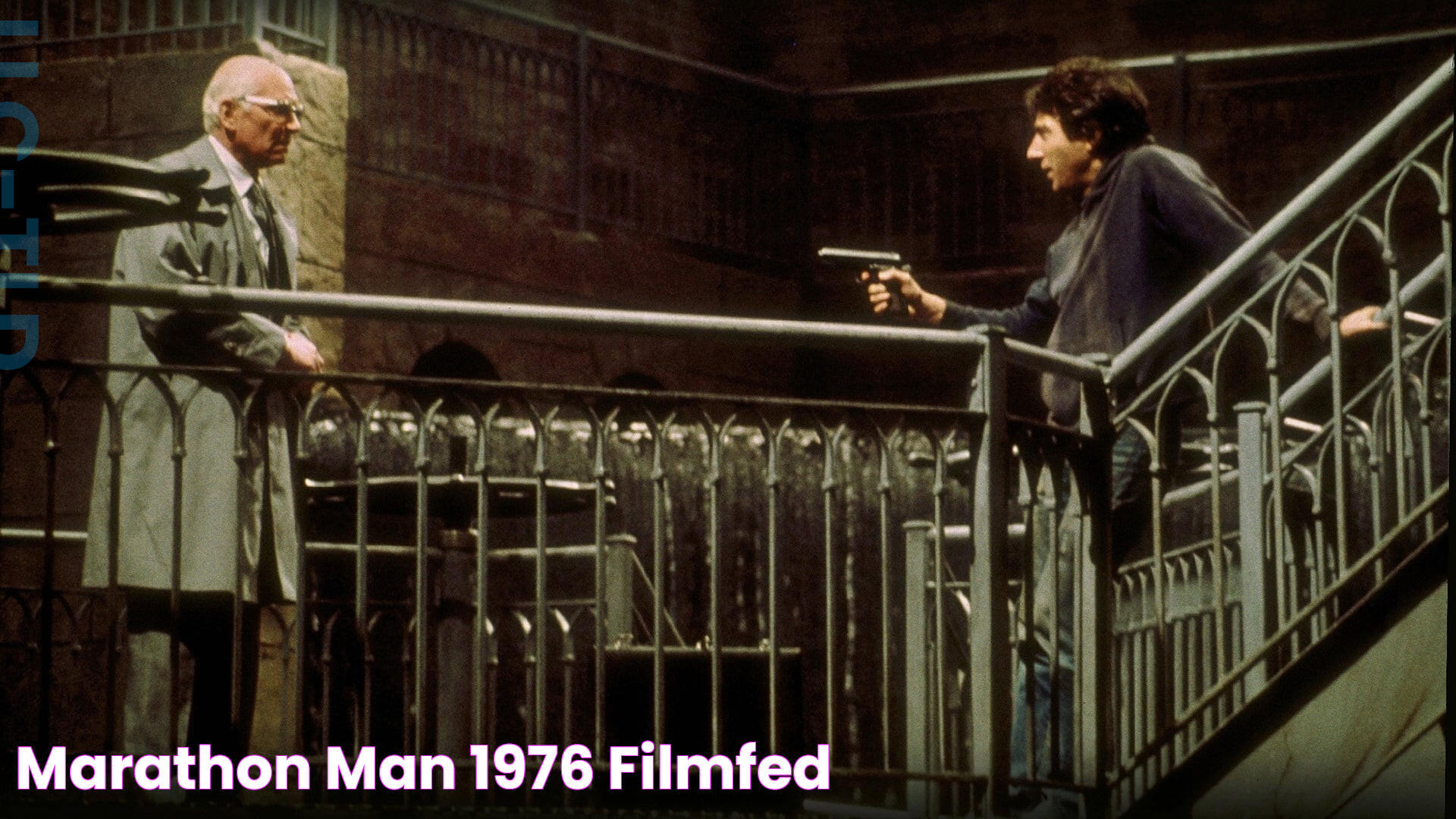The 1976 thriller, "Marathon Man," directed by John Schlesinger, stands as a hallmark in the history of cinema, largely due to its gripping storyline and the remarkable performances delivered by its cast. The film, based on William Goldman's novel, captivated audiences with its intense narrative and psychological depth, leaving a lasting impact that resonates even today. The cast of "Marathon Man" played a pivotal role in bringing this chilling tale to life, each actor contributing their unique flair and dedication to creating a masterpiece that continues to be celebrated decades after its release.
The ensemble cast of "Marathon Man" comprised a mix of seasoned actors and rising stars, whose performances were lauded for their complexity and nuance. The film starred Dustin Hoffman as the protagonist, Thomas "Babe" Levy, a graduate student who unwittingly becomes embroiled in a dangerous conspiracy. Laurence Olivier, portraying the menacing Dr. Christian Szell, delivered a chilling performance that earned him an Academy Award nomination for Best Supporting Actor. These central performances were complemented by the likes of Roy Scheider, William Devane, and Marthe Keller, each bringing depth and authenticity to their roles.
Exploring the dynamics and chemistry among the cast members of "Marathon Man" offers a fascinating glimpse into the film's enduring legacy. From Hoffman's dedication to method acting, which saw him immerse himself completely in his character's psyche, to Olivier's commanding presence that elevated the tension on screen, the cast's commitment to their craft was evident in every scene. This article delves into the backgrounds and contributions of each key cast member, examining how their performances shaped the film's success and examining the broader impact of "Marathon Man" on the thriller genre.
Read also:Dr Dre Music Maestro And Cultural Icon
| Actor | Role |
|---|---|
| Dustin Hoffman | Thomas "Babe" Levy |
| Laurence Olivier | Dr. Christian Szell |
| Roy Scheider | Henry "Doc" Levy |
| William Devane | Peter Janeway |
| Marthe Keller | Elsa Opel |
Table of Contents
- Biography of the Cast
- Dustin Hoffman: Bringing Babe Levy to Life
- Laurence Olivier: The Menacing Szell
- Roy Scheider: The Enigmatic Doc
- William Devane: Crafting the Complex Janeway
- Marthe Keller: The Intriguing Elsa Opel
- How Did Method Acting Influence the Cast's Performances?
- What Was the Chemistry Like Among the Cast Members?
- The Legacy of "Marathon Man" in Cinema
- What Happened Behind the Scenes of Marathon Man?
- How Did the Film Influence the Thriller Genre?
- Awards and Recognition for the Cast
- Impact on the Cast's Careers
- Frequently Asked Questions
- Conclusion
Biography of the Cast
The cast of "Marathon Man" was composed of some of the most esteemed actors of their time, each bringing a wealth of experience and talent to the film. Dustin Hoffman, a method actor renowned for his dedication to character immersion, had already made a name for himself with performances in "The Graduate" and "Midnight Cowboy." Laurence Olivier, a legendary figure in theater and film, was known for his commanding presence and ability to bring depth to even the most sinister characters. Roy Scheider, fresh off his success in "Jaws," added a layer of intensity and complexity to his role as Doc.
Dustin Hoffman: Bringing Babe Levy to Life
Dustin Hoffman's portrayal of Thomas "Babe" Levy was a testament to his skill as an actor, blending vulnerability with tenacity. Hoffman's commitment to the role was evident in his physical and emotional preparation, which included intense running sessions to authentically capture the character's physicality. His performance was praised for its authenticity and depth, drawing audiences into Babe's world of fear and intrigue. Hoffman's ability to convey the character's psychological turmoil and transformation was central to the film's success, solidifying his reputation as one of the industry's most talented performers.
Laurence Olivier: The Menacing Szell
Laurence Olivier's portrayal of Dr. Christian Szell, the film's antagonist, was both chilling and captivating. Olivier, known for his mastery of Shakespearean roles, brought a level of gravitas and sophistication to Szell, making him one of cinema's most memorable villains. His ability to convey menace through subtle nuances and commanding screen presence elevated the tension in the film, earning him critical acclaim and an Academy Award nomination. Olivier's performance in "Marathon Man" demonstrated his versatility as an actor, capable of transforming into a character that was both terrifying and charismatic.
Roy Scheider: The Enigmatic Doc
Roy Scheider's role as Henry "Doc" Levy, Babe's brother, added a layer of complexity to the film's narrative. Scheider, known for his work in "The French Connection" and "Jaws," brought a sense of mystery and depth to Doc, creating a character that was both protective and enigmatic. His interactions with Hoffman provided a dynamic contrast, highlighting the tension between familial loyalty and the dangerous world of espionage. Scheider's performance was praised for its subtlety and intensity, contributing to the film's immersive experience.
William Devane: Crafting the Complex Janeway
William Devane's portrayal of Peter Janeway, a character shrouded in ambiguity, was a key element in the film's suspenseful plot. Devane, known for his versatile acting skills, delivered a performance that was both engaging and unpredictable. His ability to navigate the intricacies of Janeway's character made him a pivotal figure in the narrative, keeping audiences on the edge of their seats. Devane's work in "Marathon Man" showcased his talent for creating complex characters that resonate with viewers long after the credits roll.
Marthe Keller: The Intriguing Elsa Opel
Marthe Keller's performance as Elsa Opel added an intriguing dimension to the film's storyline. Keller, an accomplished actress with a background in European cinema, brought a sense of mystery and allure to Elsa, making her a captivating presence on screen. Her chemistry with Hoffman added depth to their interactions, enhancing the emotional stakes of the film. Keller's portrayal of Elsa was praised for its subtlety and complexity, contributing to the film's overall tension and intrigue.
Read also:Insights Into Cbs News From Its Beginnings To Modern Day Influence
How Did Method Acting Influence the Cast's Performances?
Method acting played a significant role in shaping the performances of the "Marathon Man" cast, particularly for Dustin Hoffman. This approach, characterized by actors immersing themselves fully in their characters, allowed for authentic and deeply resonant portrayals. Hoffman's dedication to method acting was evident in his preparation for the role of Babe Levy, where he engaged in rigorous physical training and immersed himself in the character's emotional journey. This commitment to authenticity elevated the film's realism, drawing audiences into the intense and suspenseful narrative.
What Was the Chemistry Like Among the Cast Members?
The chemistry among the cast members of "Marathon Man" was a crucial factor in the film's success. The dynamic interplay between Hoffman, Olivier, Scheider, Devane, and Keller created a palpable tension that resonated on screen. The actors' ability to navigate the complexities of their relationships, both adversarial and familial, added depth to the narrative, enhancing the film's emotional impact. This chemistry was particularly evident in scenes between Hoffman and Olivier, where the tension between their characters reached a fever pitch, captivating audiences and leaving a lasting impression.
The Legacy of "Marathon Man" in Cinema
"Marathon Man" holds a significant place in cinematic history, not only for its gripping storyline and intense performances but also for its lasting impact on the thriller genre. The film's exploration of themes such as trust, betrayal, and the pursuit of truth resonated with audiences, leaving a lasting impression that continues to influence filmmakers today. Its success paved the way for future thrillers, inspiring a new wave of films that prioritize psychological depth and intricate narratives.
What Happened Behind the Scenes of Marathon Man?
The production of "Marathon Man" was marked by a series of intense and memorable behind-the-scenes moments. The dedication of the cast and crew to bringing the story to life was evident in the meticulous attention to detail and commitment to authenticity. From Hoffman's rigorous training regimen to Olivier's commanding presence on set, the collaborative efforts of those involved were instrumental in creating a film that has stood the test of time. Behind-the-scenes anecdotes, such as Hoffman's dedication to method acting and the camaraderie among the cast, offer fascinating insights into the making of this iconic film.
How Did the Film Influence the Thriller Genre?
"Marathon Man" had a profound influence on the thriller genre, setting a new standard for suspenseful storytelling and character development. Its emphasis on psychological tension, intricate plotting, and dynamic character relationships inspired a wave of films that sought to emulate its success. The film's legacy is evident in the numerous thrillers that followed, many of which drew inspiration from its innovative approach to storytelling and its ability to captivate audiences with its gripping narrative.
Awards and Recognition for the Cast
The cast of "Marathon Man" received widespread acclaim for their performances, with Laurence Olivier earning an Academy Award nomination for Best Supporting Actor. The film's success at the box office and its enduring popularity among audiences and critics alike cemented its status as a classic of the thriller genre. The accolades and recognition garnered by the cast were a testament to their skill and dedication, further solidifying their reputations as some of the finest actors of their time.
Impact on the Cast's Careers
The success of "Marathon Man" had a significant impact on the careers of its cast members, elevating their profiles and opening doors to new opportunities. Dustin Hoffman's performance as Babe Levy further solidified his reputation as a leading man in Hollywood, while Laurence Olivier's portrayal of Szell showcased his versatility as an actor. Roy Scheider, William Devane, and Marthe Keller also benefited from their involvement in the film, with each actor gaining recognition for their contributions to its success. The film's legacy continues to influence the careers of its cast, with their performances remaining a benchmark for excellence in the industry.
Frequently Asked Questions
- What inspired the story of "Marathon Man"?
The story of "Marathon Man" was inspired by William Goldman's novel of the same name, which explores themes of trust, betrayal, and the pursuit of truth.
- How did Dustin Hoffman prepare for his role in "Marathon Man"?
Dustin Hoffman prepared for his role by engaging in rigorous physical training, immersing himself in the character's emotional journey, and employing method acting techniques to achieve authenticity in his performance.
- What made Laurence Olivier's performance in "Marathon Man" so memorable?
Laurence Olivier's performance was memorable due to his ability to convey menace through subtle nuances and his commanding screen presence, which elevated the tension in the film and earned him critical acclaim.
- How did the film "Marathon Man" influence future thrillers?
The film influenced future thrillers by setting a new standard for suspenseful storytelling, emphasizing psychological tension, intricate plotting, and dynamic character relationships, inspiring a wave of films that sought to emulate its success.
- What was the reception of "Marathon Man" upon its release?
Upon its release, "Marathon Man" received widespread acclaim from audiences and critics alike, praised for its gripping narrative and intense performances, and it achieved commercial success at the box office.
- What legacy did "Marathon Man" leave in the film industry?
"Marathon Man" left a lasting legacy in the film industry by influencing the thriller genre, inspiring filmmakers with its innovative storytelling approach, and leaving an indelible mark on cinematic history.
Conclusion
The legacy of the cast of "Marathon Man" is firmly rooted in their exceptional performances, which continue to captivate audiences and inspire filmmakers decades after the film's release. The dedication and skill demonstrated by Dustin Hoffman, Laurence Olivier, Roy Scheider, William Devane, and Marthe Keller played a pivotal role in shaping the film's success, leaving a lasting impact on the thriller genre. As we reflect on the contributions of these talented actors, we are reminded of the power of cinema to transport us into worlds of suspense and intrigue, where the line between trust and betrayal is as thin as a razor's edge.

